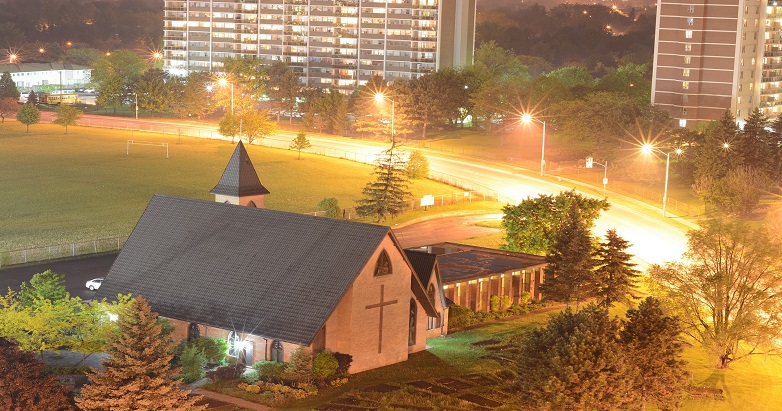We are in a housing crisis, with rents rising faster than wages. Here’s how the church can help.

The Housing Crisis
Across the country, people with little or no income find it increasingly difficult to make ends meet. Landlords are raising their prices at a rate inconsistent with people’s ability to pay. Developers aren’t keeping pace with the demand for housing. All of this results in a housing crisis that literally leaves many out in the cold. November 8 is World Urbanism Day (World Town Planning Day). When the housing crisis results in a homelessness crisis, it becomes incumbent on the Church to help with urban planning.
Many churches find themselves struggling with waning attendance and income. Often this means pay cuts or layoffs for church staff. Large churches with extensive buildings and grounds require upkeep, but the church finds it increasingly difficult to pay for professional services. As the church members age, they are unable to volunteer for these labor-intensive tasks. But the funding just isn’t there to hire someone. Every community has people who are able-bodied but low-income, who would love the opportunity to clean a church or maintain the building and grounds. Labor isn’t an issue. The problem is that struggling churches with declining numbers simply can’t pay a fair wage. But there is a solution.
Churches With Hoarding Disorder
As old churches decline in membership, often large parts of their buildings fall into disuse. Back in their heydays of the 1950s or 1980s, churches were busting at the seams with congregants. They built extensive kitchens, fellowship halls, and classrooms. By the time I served churches in the 1990s through the 2010s, these properties had vacant space, filled only with unused choir robes and Christmas pageant props. Unable to fill their space with people, these churches begin hoarding things. Click here to read my article, “Does Your Church Have Hoarding Disorder?” A church with too much extra space becomes unhealthy as it hoards remembrances of the past, rather than using its space to build the future.
Classrooms as Apartments
One church I served had an extra thousand square feet. It also struggled to pay a custodian and groundskeeper. I saw a solution to the problem in the collection of unused classrooms that could have easily been converted into two small apartments. The church could have renovated these rooms and offered them as cashless compensation for two needy, but capable, individuals in our community. In this way, the church could have provided housing for people who otherwise could not afford it. They could have also offered those people the gift of dignity, by allowing them to earn their keep. Even if it cost money to renovate the room, the church would have recouped that investment in a year with the cash salaries they would not have to pay for upkeep and cleaning of the building and grounds. Click here to read about a church that turned its classrooms into low-income apartments, in the town where I live.
The Parsonage as a Boarding House
Another way churches can help with the housing crisis is by repurposing unused parsonages, rectories, or manses. Many churches still find that pastoral candidates are attracted to churches that offer housing as part of their compensation. However, just as many churches call ministers who already own homes in the community or who are in a financial position to purchase a home. I have known some churches to overlook pastoral candidates who do not wish to live in parsonages. Such churches do themselves a disservice by disqualifying qualified candidates simply because the church wants proprietary control over their pastor. It’s far better for the church and the pastor when the church pays the kind of salary where the pastor can afford to be a homeowner. Then, the church can repurpose the parsonage.
One church I served rented out its parsonage for a couple of years in between pastors. The renters were a sweet family who could afford the payments on a large and accommodating property. I take no issue with this—sweet families need housing too. But how would it be if churches with large rectories unused by their pastors decided to use those properties to help low-income individuals affected by the housing crisis? Churches could transform their manses into boarding-style houses. A four-bedroom home could provide affordable housing for four low-income people who agree to communal living spaces. Click here to read about a church that has transformed its former parsonage into a boarding house for people unsheltered individuals.
Got a Large Church Yard? How About Tiny Homes?
Most of the rural churches I served boasted extensive properties, with acres and acres of unused grass to cut. What if the church offered its yard to host a tiny home village for people experiencing homelessness? Even if the church building itself doesn’t house anyone, its yard could be a sanctuary for many of your community’s most needy. Click here and here to read about churches that are doing just that.
Addressing Problems of Congregate Living
It almost goes without saying that congregate living of this nature is going to result in chaos or conflict on some level. As a housing case manager, I came to expect this. Many in the church might not be prepared to deal with the soap operas that result from this kind of living. But isn’t that what the church is called to do—assisting those in need, and helping them to live better lives? To address this, the church could assign a particular deacon to work with the families who live on church property.
How Your Church Can Help With the Housing Crisis
If you own a home in a White, middle-class neighborhood, you might be blissfully unaware that we are in a housing crisis. But if you’ve noticed the growing homelessness problem, you must understand that it is directly related to a lack of affordable housing. The church can help. Between unused church buildings and unoccupied parsonages, the church holds a lot of available real estate. If we take seriously our call to help those who struggle, then we must loosen both are purse strings and our attachments to the concept of holy ground.
Does Housing Make Your Church Unholy?
Some people shrink from the idea of people living on church property. After all, humans do all kinds of unholy things! But allowing people to live their profane lives (all of us live profane lives) on the holy ground could be a blessing to them. Maybe instead of worrying about the unholy, we should consider that our churches would become even more holy if we let people live in them. Perhaps allowing our church buildings to become profane is the most sacred thing we could do.













